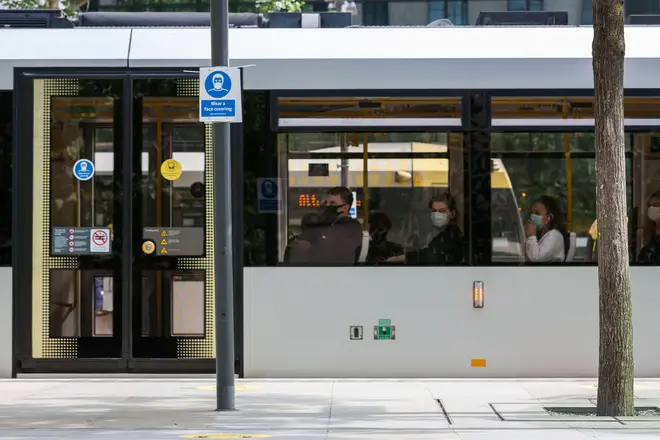
Ali Miraj 12pm - 3pm
14 July 2021, 19:12 | Updated: 15 July 2021, 00:47

Passengers will still need to wear masks on public transport and stations in parts of England after July 19 following interventions from regional mayors.
Six local leaders have demanded the Government keep face masks compulsory on public transport as Sadiq Khan said Londoners will still need to use them - though their powers could result in a hodgepodge of face mask rules.
There will no longer be a legal requirement to wear masks after July 19's 'Freedom Day' unlocking in England but Boris Johnson has said they should be worn in some situations.
Mr Khan, the mayor of London, has said he will make mask-wearing a condition of carriage on Transport for London services after Monday.
Read more: People 'expected to wear masks' indoors in England after 19 July - minister
Read more: Sadiq Khan: Vast majority of Londoners support compulsory face masks on transport
But Labour mayors of West Yorkshire, Greater Manchester, Liverpool City Region, North of Tyne, West of England and Sheffield City Region said their abilities to enforce mask-wearing is limited.
Greater Manchester's mayor Andy Burnham pointed out he could mandate them on the Metrolink tram service but not on buses.
He said he feared for the clinically most vulnerable, who he worried may be forced off public transport altogether if they face having to travel with people who don't wear masks in enclosed spaces.

Sadiq Khan quizzed over enforcement of mask policy by bus driver
"We remain of the view that the best solution is for the Government to maintain a requirement of face coverings on all modes of public transport and we call on them, even at this stage, to return to that position," he said on Wednesday.
"Unlike the mayor of London, we do not have the same powers over buses and trams, but we believe the requirement on our trams will help increase the use of face coverings on other transport modes."
He added that people need to "think in terms of collective safety rather than individual freedom or personal responsibility".
Read more: Ben Kentish challenges PM on plan to scrap mandatory face masks
Read more: Face masks: Everything you need to know about new rules from July 19
Earlier, Tracy Brabin, mayor of West Yorkshire, said face masks will still need to be worn in bus stations operated by the West Yorkshire Combined Authority.
But her powers do not allow her to extend that to buses and trains.
"With 71% of the public supportive of the continued use of face coverings, I am today mandating the use of face coverings across bus stations in West Yorkshire," she said.
"Whilst I would like to go further to include buses and trains, we are doing what is in our power.

Boris Johnson admits a face mask in confined spaces is 'common sense'
"I have been consistently clear with Government, they have the power to mandate face masks across all transport networks and I would support them to make that decision as restrictions lift."
The bus station mandate will also be implemented in South Yorkshire's combined authority-operated stations, where mayor Dan Jarvis said: "A national mandate would without a doubt be more effective and create less confusion for passengers and fewer challenges for staff."
Transport North East said it will require face coverings for commuters on the Metro system while West of England mayor Dan Norris said he did not have the powers to force mask-wearing on public transport.
But he asked Boris Johnson to keep them compulsory.
Conservative West Midlands mayor Andy Street said he could not implement a mandate for face coverings and said any change in the law would have to come from the Government.
He said that Transport for West Midlands expected passengers to keep wearing masks.
Boris Johnson said previously that "guidance will suggest where you might choose (to wear masks), especially when cases are rising and where you come into contact with people you don't normally meet in enclosed spaces, such as of course, crowded public transport".